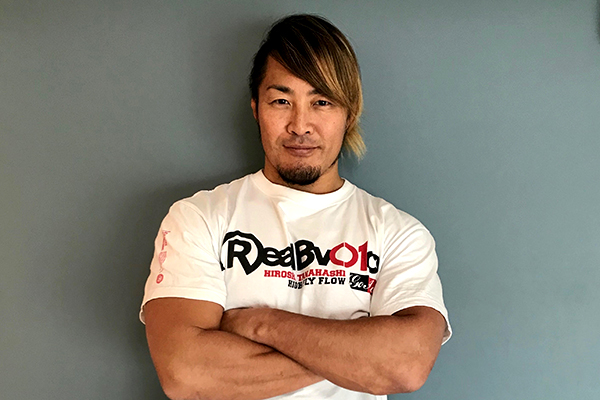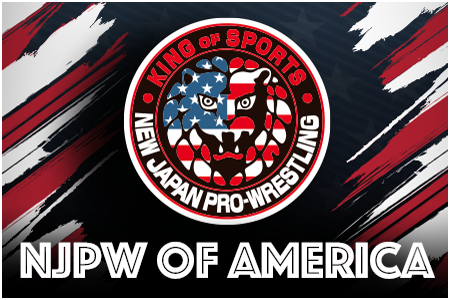Hiroshi Tanahashi’s life story can now be told in this series of autobiographical interviews, available for the first time in English!

Ace’s HIGH #59 Coming June 9!->
–Last time we talked about your 2007 G1 win. You went from there, having beaten IWGP Heavyweight Champion Yuji Nagata in the final, to facing him for the title on October 8 in Ryogoku. The big surprise here was you wrestling in old school black tights.
Tanahashi: I’d worn black tights on the Wrestle Land shows, but here I was wearing them on a main roster event. These were different ones, newer, but there were those at Wrestle Land saying I should be in black tights full time, like a Young Lion.
–They certainly fit the traditional Strong Style image.
Tanahashi: There was a little bit of passive aggression from me in there. The people that were booing me were doing it with the point of view that I wasn’t ‘New Japan’ enough for them, so this was a message to those fans. Like ‘is this New Japan enough for you?’
–But after the match when you were asked about your costume choice, you just replied that ‘these are sexy’.
Tanahashi: Well that was more passive aggressiveness right there. Wear the outfit and then deliberately say something non ‘New Japan like’. Doing it with a straight face only helped. You know I think there were so many people insistent ‘New Japan is Strong Style’ but then being completely unable to say what Strong Style actually was or meant. That drove me mad, I think. I think we talked about this; I actually asked Antonio Inoki straight up what it meant.

–In Weekly Playboy magazine.
Tanahashi: And all he said in return was ‘I have no idea’, which kind of told me all I needed to know.
–It was really a term the media at the time coined and put in circulation. Nagata certainly represented that old school style, as we’ve discussed, but what are your thoughts looking back on that match?
Tanahashi: By this time, the High Fly Flow was my primary finish, and the structure of my matches was fairly locked down, but I was still experimenting with some other moves, like the uranage, or the 12-6 suplex. I don’t use uranage at all now, but I knew that Nagata was always going to come forward with strikes, so it was basically a counter for me.
–The match was all about the High Fly Flow. The first time you tried it, Nagata got the knees up, the second time he kicked out at two. Then when you went for it a third time, he tried to meet you at the top rope, but you fought him off with a headbutt and hit the move for the three count.

Tanahashi: It wasn’t a pretty end there, but it was about beating Nagata by any cost, I think. Nagata certainly had the lion’s share of the fan support, so it was about me winning while shutting them up as well, heh.
–In your post match address you said ‘just like before, I’ll figure something out’
Tanahashi: That was in response to the company’s situation at the time.
–This was the first time for NJPW to use the smaller arena style configuration of Ryogoku. The announced crowd was 7,800 but the true figure would have been fewer.
Tanahashi: I think there were more than a few fans there that night who remembered when business was booming. I wanted to tell them that I wasn’t going to sell them short.
–This marked the beginning of your second reign. You have said in the past that the atmosphere in the locker room during what gets called the dark ages for New Japan was particularly gloomy.
Tanahashi: It was still pretty bleak at this point. It’s pretty difficult to carry the company as champion when you’re getting booed out the building. I felt a bit like the elephant in the room nobody was addressing. People didn’t come to chat; it was like they were saying ‘best leave him alone’.

–You felt you couldn’t lead, couldn’t carry things?
Tanahashi: I mean, you can’t, really, while you’re getting booed like that. I’m pretty thick headed, but looking back at it, that’s just the way it was. But I still just stuck to my guns, was convinced I could make it happen. In the 2000s, business was in a slump, it wasn’t just us. But if we kept going the way things were there was no way we could turn a corner. So there had to be that process of looking for an answer as we went.
–Trial and error has been a theme for you through this period.
Tanahashi: One of the things that I love about pro-wrestling is the straightforward morality play aspect of it. But here I was, supposedly the lead babyface, getting more heat than any of our heels. So I think this was where I started to realise the best thing to do was lean into it.
–This was when you started to be a bit more narcissistic. One odd note about this Ryogoku match was the press conference the next day. It was actually the first time you made it public that you’d been married since 2003 and had two kids.
Tanahashi: That was a part of the whole deal. It was this congratulatory press conference with a faux apology ‘sorry ladies, I’m taken’. By this point there were a bunch of pictures in the press with me pushing strollers around so I don’t think anyone was surprised. But it was a bit like the ‘My Dad’s A Heel Wrestler’ movie. Art imitating life (laughs)





